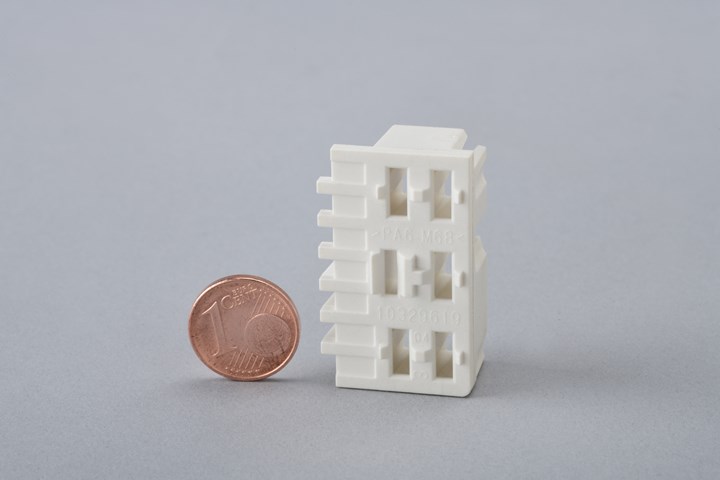Thermally Conductive Nylon 6 for Electric Sports Car Component
Cooling element for the charge controller of an electric sports car made from Lanxess’ Durethan BTC965FM30 nylon 6
Thermally conductive plastics are showing significant potential for use in thermal management of charging systems for electric vehicles. One recent example is the charge controller in the fully electric vehicle of a sports car manufacturer based in southern Germany. This controller contains a cooling element made of the thermally conductive and electrically insulating nylon 6 Durethan BTC965FM30 from Lanxess which dissipates the heat generated in the plug contacts of the controller when charging the batteries. Aside from preventing the charge controller from overheating, this structural material meets the strict requirements for flame-retardant properties, tracking resistance and design, according to technical key account manager Bernhard Helbich

The manufacturer of the entire charging system for the sports car is Leopold Kostal GmbH & Co. KG of Luedenscheid, a global system supplier of automotive, industrial and solar electrics as well as electrical contact systems. Charge controllers convert the three-phase or alternating current fed in from the charging station to direct current and control the charging process. During the process, they limit the charging voltage and current to prevent overcharging of the battery, for example. A current with an amperage of up to 48 amps flows through the plug contacts in the charge controller of the sports car, causing significant generation of heat during charging. “Our nylon is filled with special mineral heat-conducting particles that conduct this heat efficiently away from the source,” says Helbich. These particles give the compound a high thermal conductivity of 2.5 W/m∙K in the direction of melt flow (in plane) and 1.3 W/m∙K perpendicular to it (through plane).
Related Content
-
ICIS Launches: Ask ICIS Generative AI Commodities Assistant
Said to be the first of its kind, this AI assistant will enhance access to ICIS’ intelligence and insights for the energy and chemical markets.
-
Prices Up for All Volume Resins
First quarter was ending up with upward pricing, primarily due to higher feedstock costs and not supply/demand fundamentals.
-
What is the Allowable Moisture Content in Nylons? It Depends (Part 1)
A lot of the nylon that is processed is filled or reinforced, but the data sheets generally don’t account for this, making drying recommendations confusing. Here’s what you need to know.












